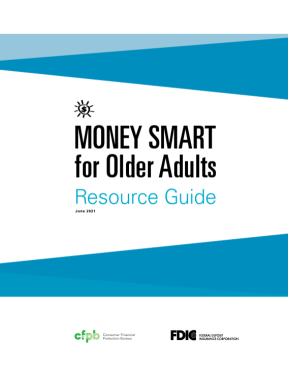Money Smart for Older Adults
Money Smart for Older Adults is an instructor-led training developed to teach older adults and caregivers of older adults about elder financial exploitation and why they may be at risk.
Money Smart for Older Adults (MSOA) is an instructor-led training that provides information and resources to help older adults and their caregivers identify and avoid financial exploitation through fraud and scams. The guide also encourages advanced planning and informed financial decision-making. Developed by the Federal Deposit Insurance Corporation (FDIC) and Consumer Financial Protection Bureau (CFPB), the curriculum covers seven topics:
- Common Types of Elder Financial Exploitation
- Scams Targeting Veterans
- Identity Theft
- Medical Identity Theft
- Scams that Target Homeowners
- Planning for Unexpected Life Events
- How to Be Financially Prepared for Disasters
The following files are available for download:
- Instructor Guide, English
- Resource Guide, English
- Slides, English (PowerPoint)
- Slides, English (PDF)
- Slides, Spanish (PowerPoint)
- Slides, Spanish (PDF)
The original version of Money Smart for Older Adults will continue to be offered in Spanish until the updated version of Money Smart for Older Adults is available in Spanish. The three-part module consists of an instructor guide (English), a resource guide (English and Spanish), and a PowerPoint presentation (English and Spanish).
Instructors can use the the curriculum to teach older adults what elder financial exploitation is and why they may be at risk. MSOA is also a tool for bank-community partnerships. For example, bank staff could deliver this information in collaboration with providers of senior services or adult protective services.
This site includes links to information created by other public and private organizations. These links are provided for the user’s convenience. The U.S. Department of Education does not control or guarantee the accuracy, relevance, timeliness, or completeness of this non-ED information. The inclusion of these links is not intended to reflect their importance, nor is it intended to endorse views expressed, or products or services offered, on these non-ED sites.
Please note that privacy policies on non-ED sites may differ from ED’s privacy policy. When you visit lincs.ed.gov, no personal information is collected unless you choose to provide that information to us. We do not give, share, sell, or transfer any personal information to a third party. We recommend that you read the privacy policy of non-ED websites that you visit. We invite you to read our privacy policy.
